English : Unit 5 : Prose : Water – The Elixir of Life – by Sir C V Raman
Warm up
* Do you think the living organisms in this planet can survive without water? Why?
* Where do you get your drinking water from?
* Is the drinking water you use in your home treated?
* If not, how do you purify it?
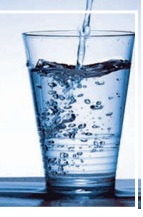
* What is the imaginary elixir of life?
Divine Amritha is the imaginary elixir of life.
* What according to the writer is the real elixir of life?
According to the writer, water is the real elixir of life.
* What is the ‘wonderful difference’ the writer talks about in the passage?
The Libyan desert lies with a sea of billowing sand. While the valley of the Nile in Egypt, which lies next to it is teeming with life and vegetation. The writer talks about this wonderful difference.
* What is the ‘cheering sight’ mentioned in the paragraph?
The rain fed tanks which are full is the ‘cheering sight’ mentioned in this paragraph.
* What does the writer compare water in a landscape to?
The writer compares water in a landscape to the eyes in a human face.
How does the water in rainfed tanks get its colour?
The water in rainfed tanks gets its colour from the suspended finely divided soil in it.
* What is the main cause of soil erosion?
Sudden bursts of heavy rains result in large run of surplus water. This is the main cause of soil erosion.
* What other factors add to the erosion of precious soil?
The slope of the land, the removal of vegetation, water flowing along ruts and the absence of any checks to such flow add to the erosion of precious soil.
* How can soil erosion be prevented?
Soil erosion can be prevented by: i) terracing of land ii) construction of bunds to check the flow of water iii)the practice of contour cultivation iv.) the planting of appropriate types of vegetation.
* How does prevention of soil erosion serve a double purpose?
Prevention of soil erosion will save the soil and help to conserve and keep the water where it is wanted.
* What are the two sources of water?
Artesian and rain water or snow fall are the two sources of water.
* What happens to the rain water?
Much of the rain water runs off the ground. It flows into streams and rivers and ends up in the sea.
* What is the idea of civilized forest?
The systematic planting of suitable trees in every possible and impossible area is called civilized forest.
* How can you check soil erosion?
Afforestation would check soil erosion.
* What is the cheapest means of transport?
The cheapest means of transport is by boats.
* How can you make a difference in the countryside?
We can make a difference in the country side by the availability of electric power.
Glossary
elixir (n) – a hypothetical substance believed to maintain life indefinitely/ a substance believed to cure all ills
billowing(adj.)- characterized by great swelling waves or surges
teeming(adj) – abundantly filled especially with living things
trickling (v) – to flow slowly and with out force
precipitate (v) – a solid substance that is produced from a liquid during a chemical process
crust (n) – a hard outer covering of something
catchment (n) – a structure, such as a basin or a reservoir, used for collecting or draining water
barges (n) – a long boat with aflat bottom, used for carrying freight on rivers
A. Answer the following questions briefly in one or two sentences.
1. What makes water one of the most powerful and wonderful things on earth?
Water is the elixir of life. If there is no water, there won’t be any living organism or vegetation on the earth. It makes water one of the most powerful things on earth. Water shapes the course of the earth’s history.
2. How does water help in the formation of fertile lands?
Water carries silt or finely divided soil in suspension. The land which is formed by silt is proved to be fertile.
3. How does soil erosion happen and what are its main causes?
Sudden heavy rain causes flood. It washes away the top soil. The slope of the land, removal of vegetation and existence of ruts are the causes of soil erosion.
4. What are some measures that are used to prevent soil erosion?
The terracing land, afforestation, the practice of contour cultivation and construction of bunds are some measures to prevent soil erosion.
5. How, according to Sir C. V. Raman, can rainwater as well as the water of rivers be prevented from going to waste?
The systematic planting of suitable trees can prevent rain water from going to waste.
B. Answer the following in about 80-100 words.
1. How does C.V. Raman show that water is the real elixir of life?
Title : Water – The Elixir of Life
Author : Sir C.V. Raman
Theme : “Waste not, Want not”
According to Sir C.V. Raman, water is the elixir of life. In the ancient times civilization developed near the rivers. Water plays an important role in life. Water adds beauty to the country side. Water carries slit and makes the land fertile. Water is the basis of all life. It is necessary for animal life and growth of plants and trees. Water is the commonest of liquids. But it is the uncommon of liquids with amazing properties. They are responsible for maintaining human, animal and plant life. We can produce hydroelectric power from water. Water ways is the cheapest mode of transport. Thus without water life is impossible.
“Make hay while the sun shines”
2. Water exists in all plant and animal forms– Explain.
Title : Water – The Elixir of Life
Author : Sir C.V. Raman
Theme : Water exists in all plant and animal forms
According to Sir C.V. Raman, water is the basis of life. Every animal or plant contains a large proportion of water in its body. All physiological activities are possible only when the liquid water play its essential part. Water is necessary for animal iife. It is equally essential for plants and trees to grow. Only the quantity necessary varies with species. Thus existence of every animal or plant is possible only with water. Therefore, it is clear that water is the elixir of all life.
“No rain, no gain; No rain, more pain”
3. Life cannot exist on earth without water – Explain.
Title : Water – The Elixir of Life
Author : Sir C.V. Raman
Theme : No life is possible without water
Water is the elixir of life. Water is the basis of life. This common substance plays a vital role in the life of human, animal and plant. It is the most powerful thing on the earth. It has the key role in the drama of life. Every animal or plant contains a large proportion in its body. Physiological activity is which the water plays the essential part. Water is necessary for animal life. It is necessary for the growth of plant and tree. Water is essential in human life. Thus it is clear that water exists in all life and life cannot exist on earth without water.
“Where there is water, there is life”
COMMON PARAGRAPH
PARAGAPH FOR TOPPERS:
Synopsis:
• Introduction
• Nile Valley
• South India – The land of rainfed tanks
• Soil erosion
• Prevention of soil erosion
• Civilized Forests
• Conclusion
Introduction:
Water is the commonest of all liquids. It is the life giver of all the creatures on earth. The divine Amrita is an imaginary one. But the true elixir of life is water. Sir C.V. Raman brings out the importance of water.
Nile Vaiiey:
The Nile Valley is fertile because of the water of the river Nile flowing into it. Egypt in fact, was made by its river. On the one side was a sea sand. On the other side was the most fertile land. An ancient civilization was created and is sustained by the Nile.
South India – The land of rainfed tanks:
The rainfed tanks are common in South India. But they are not maintained. These tanks play an important role in agriculture. Water carries silt or finely soil in suspension. This gives colour to water. The colour of the water changes from the muddy red and green and finally to the blue of the deep sea.
Soil erosion:
The main cause of soil erosion is sudden burst of heavy rain. The result is large run of surplus water. Sudden heavy rain causes flood. It washes away the soil. The slope of the land, removal of vegetation and existence of ruts are the causes of soil erosion.
Prevention of soil erosion:
Soil erosion can be prevented by terracing of land, construction of bunds to check the flow of water, the practice of contour cultivation, the planting of appropriate types of vegetation.
Civilized Forests:
Civilization are formed only in the river beds. The planting of suitable trees in all areas is called civilized forests. They would check soil erosion. Civilized forests help in preventing soil erosion and conserve water.
Conclusion:
Water is the most common of liquids. It is responsible for bearing animal and plant life. We must conserve water and use it carefully.
PARAGRAPH FOR AVERAGE STUDENTS:
Title : Water – The Elixir of Life
Author : Sir C.V. Raman
Theme : No life is possible without water
Water is the commonest of all liquids. It is the life giver of all the creatures on earth. Water is very essential for plants and animals. Rivers are called as the cradles of civilization. The rain water is filled in rainfed tanks. The rainfed tanks are common in South India. But they are not maintained. Water carries silt or finely divided soil in suspension. This gives colour to water. The main cause of soil erosion is sudden burst of heavy rain. Soil erosion can be prevented by many ways. Preventing soil erosion and afforestation conserve water. Civilization are formed only in the river beds. We must conserve water and use it carefully.
PARAGRAPH FOR LATE BLOOMERS:
• Water is the commonest of all liquids.
• It is the life giver of all creature.
• Rivers are called as the civilization
• Plants and animals have water in their bodies.
• The rain water is filled in rainfed tanks.
• Water is essential for life.
• It helps to maintain the food chain.
• We must conserve water and use it carefully.
C. Given below are some idioms related to water. Match the idioms with it’s meaning.
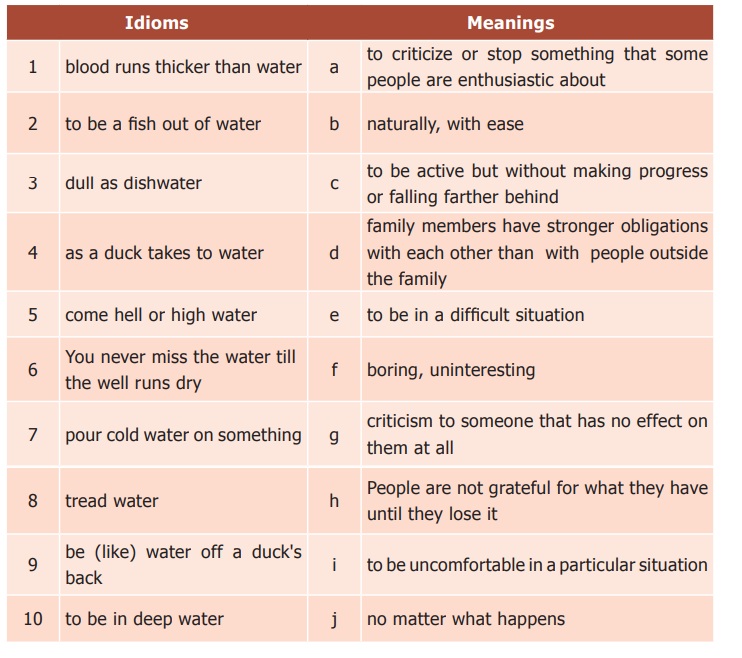
Answer: l.(d) 2.(i) 3.(f) 4.(b) 5.(j) 6.(h) 7.(a) 8.(c) 9.(g) 10.(e)
Idioms : Meanings
1. blood runs thicker than water : family members have stronger obligations with each other than with people outside the family
2. to be a fish out of water : to be uncomfortable in a particular situation
3. dull as dishwater : boring, uninteresting
4. as a duck takes to water : naturally, with ease
5. corhe hell or high water : no matter what happens
6. You never miss the water till the well runs dry : People are not grateful for what they have until they lose it
7. pour cold water on something : a to criticize or stop something that some people are enthusiastic about
8. tread water : to be active but without making progress or falling farther behind
9. be (like) water off a duck’s back : criticism to someone that has no effect on them at all
10. to be in deep water : to be in a difficult situation
D. Water is a scarce resource. Discuss the causes, problems and solutions to water scarcity and write them below.
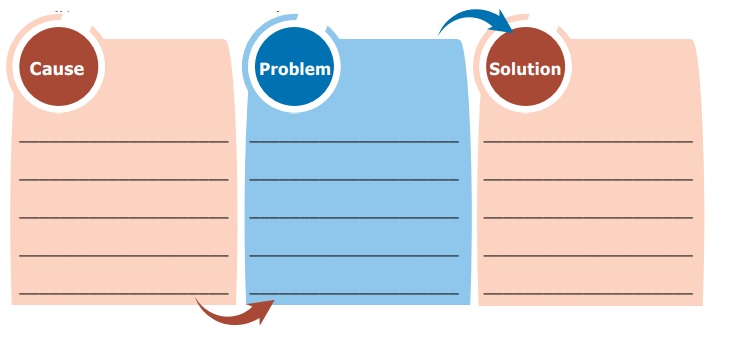
Cause : Pollution : Solution
Over use of water : Lack of education : Recycle rain water
Water wastage : Sanitation issues : Preserve catchment areas
Pollution : Lack of access to drinking water : Improve practices related to law
Drought : Diseases and parasites : Improve sewage system
Destruction of water catchment areas : Hunger due to poor cultivation : Support clean water initiatives
Restriction by governments Distance : Mixing factory wastes into water sources : Prevent water pollution by law

LISTENING
E. On the basis of the listening passage, choose the correct answer from the given options.
Severn Cullis-Suzuki (born November 30, 1979 in Vancouver, British Columbia) is a Canadian environmental activist. She has spoken around the world about environmental issues, urging listeners to define their values, act with the future in mind, and take individual responsibility. In 1992, at age 12, Cullis-Suzuki raised money with members of ECO to attend the Earth Summit in Rio de Janeiro. Cullis-Suzuki presented environmental issues from a youth’s perspective at the summit, where she was applauded for her speech to the delegates.
Hello. I’m Severn Suzuki, speaking for ECO, the Environmental Children’s Organization. We are group of 12- and 13-year-olds trying to make a difference: Vanessa Suttie, Morgan Geisler, Michelle Quigg, and me. We’ve raised all the money to come here ourselves, to come 5,000 miles to tell you adults you must change your ways.
Coming up here today, I have no hidden agenda. I am fighting for my future. Losing my future is not like losing an election or a few points on the stock market. I am here to speak for all generations to come. I am here to speak on behalf of the starving children around the world whose cries go unheard. I am here to speak for the countless animals dying across this planet because they have nowhere left to go. I am afraid to go out in the sun now because of the holes in our ozone. I am afraid to breathe the air because I don’t know what chemicals are in it. I used to go fishing in Vancouver — my home — with my dad, until just a few years ago we found the fish full of cancers. And now we hear of animals and plants going extinct every day, vanishing forever.
In my life, I have dreamt of seeing the great herds of wild animals, jungles and rainforests, full of birds and butterflies, but now I wonder if they will even exist for my children to see. Did you have to worry of these things when you were my age? All this is happening before our eyes and yet we act as if we have all the time we want and all the solutions. I’m only a child, and I don’t have all the solutions. I want you to realize, neither do you. You don’t know how to fix the holes in our ozone layer. You don’t know how to bring the salmon back up a dead stream. You don’t know how to bring back an animal now extinct. And you can’t bring back the forest that once grew where there is now a desert. If you don’t know how to fix it, please stop breaking it.
Here you may be delegates of your government, business people, organizers, reporters or politicians. But really you are mothers and fathers, sisters and brothers, aunts and uncles, and all of you are someone’s child. I am only a child, yet I know we are all part of a family 5 billion strong. In fact, 30 million species strong.And borders and governments will never change that. I am only a child, yet I know that we’re all in this together and should act as one single world towards one single goal. In my anger, I am not blind, and in my fear, I am not afraid of telling the world how I feel. In my country, we make so much waste. We buy and throw away, buy and throw away, buy and throw away, and yet Northern countries will not share with the needy. Even when we have more than enough, we are afraid to share. We are afraid to let go of some of our wealth.
In Canada, we live the privileged life with plenty of food, water and shelter. We have watches, bicycles, computers and television sets. The list could go on for two days. Two days ago here in Brazil, we were shocked when we spent time with some children living on the streets. This is what one child told us, “I wish I was rich. And if I were, I would give all the street children food, clothes, medicines, shelter, and love and affection.” If a child on the streets who has nothing is willing to share, why are we who have everything still so greedy? I can’t stop thinking that these are children my own age; that it makes a tremendous difference where you are born; that I could be one of the children living in the favelas of Rio. I could be a child starving in Somalia, or a victim of war in the Middle East or a beggar in India. I am only a child, yet
I know that if all the money spent on war was spent on finding environmental answers, ending poverty and finding treaties, what a wonderful place this Earth would be.
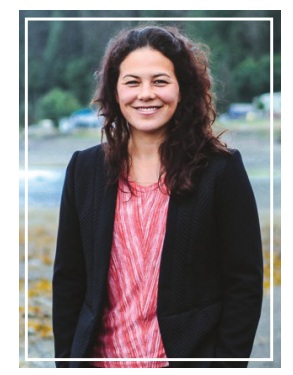
At school, even in kindergarten, you teach us how to behave in the world. You teach us to not fight with others; to work things out; to respect others; to clean up our mess; not to hurt other creatures; to share, not be greedy. Then why do you go out and do the things you tell us not to do? Do not forget why you are attending these conferences – who you are doing this for. We are your own children. You are deciding what kind of world we are growing up in.
Parents should be able to comfort their children by saying “Everything’s going to be all right. It’s not the end of the world. And we’re doing the best we can.” But I don’t think you can say that to us anymore. Are we even on your list of priorities? My dad always says, “You are what you do, not what you say.” Well, what you do makes me cry at night. You grown-ups say you love us, but I challenge you, please make your actions reflect your words. Thank you.
1. Severn Suzuki represents an organization called ECO which stands for __________
(a) Ecological Cooperation.
(b) Environmental Coordinating Organization.
(c) Environmental Children’s Organization.
(d) Ecological Children’s Organization.
2. “I am fighting for my future.” The ‘fight’ refers to her_______
a) fight to win an election.
b) fight to gain a few points in share market.
c) fight against corruption.
d) fight against environmental pollution.
3. Animals and fish are becoming extinct because _____
a) they have no place to go.
b) they die of diseases.
c) their food and habitat are polluted.
d) all the above.
4. It is evident that Severn Suzuki is concerned about all other species too as, ______
a) she considers them all belonging to one world.
b) they have nobody except her to speak for.
c) they belong to her.
d) they are all children.
5. Severn Suzuki condemns the people of her country for ____
a. contributing large amounts of waste and not sharing the excess with the needy.
b. being afraid of the poor.
c. being angry with the poor belonging to other countries.
d. being wealthy.
6. Which of the following statement is not true?
a. Canada is a rich country and people have in plenty.
b. Canadian children are privileged.
c. A Brazilian child was willing to share because she was rich.
d. Northern countries will not share with the needy
F. Answer the following questions briefly.
1. What is the humble request of the twelve- year -old to the elders?
Answer: The elders must change their ways.
2. The dream of Severn Suzuki is ______________
Answer: that all species of living things must exist.
3. The fear and agony of Severn Suzuki is ______________
Answer: that the people waste a lot and are afraid to share.
4. How does she proclaim that she represents the future generation?
Answer: She proclaims that she represents as a child.
5. The duties and responsibilities of the parents are
(a) to comfort their children saying that everything will be all right.
(b) it is not the end of the world.
(c) and we are doing the best we can.
SPEAKING
G.You are the President of GO GREEN, the Environment Club of your school. On the occasion of World Environment Day, you have been asked to address the school on the topic, ‘The Nature of Our Future Depends on the Future of Our Nature’.
PURPOSE
* To speak to a large gathering, convincingly and persuasively, to convert the listener’s view to your point of view
* To pass on a wide range of information
* To express an opinion, view, experience, observation etc.
HOW TO DELIVER YOUR SPEECH
* Divide your speech into three parts: introduction, body and conclusion.
* Start with salutation. Greet your chief guests, audience, fellow speakers and other invitees.
* Begin your speech with a catchy introduction in the form of an anecdote, thought provoking question or statistical data.
* Express your views and give reasons for the stand you take.
* Convey thoughts and ideas with clarity.
* Be factually accurate and present a balanced view.
* Provide supporting data to prove your points.
* Make your speech interesting by adding elements of humour.
* Use language that is easily understood. Keep sentences short and simple.
* Sum up your ideas; give suggestions/remedies to improve the situation.
* Thank the audience and organizers.
REMEMBER
* Do not be aggressive in manner, words or gestures.
* Be neither rude and offensive nor meek and mild.
* Enunciate your words clearly. Maintain a normal volume. Do not scream into the mic.
A sample speech is given below.
Greeting: Good morning, esteemed Chief Guest, the Head Master, teachers, dear friends and invitees. I am Shobha, Secretary of GO GREEN, the Environment Club of our school. Today, I stand before you to share my views on the topic.
Introducing Topic: Stopping pollution is the best solution
Introduction with a shocking observation: We humans have always deceived ourselves by thinking that someone else will save our planet. Can you imagine…for the past 200 years we have been conquering nature, and now…we are beating it to death by constantly polluting it. The Earth is not dying, it is being killed and the people who are killing it have names and addresses.
Factors and causes: All the human actions in this modern world directly impact the whole ecosystem.
Deforestation, vehicularpollution, urbanisation, biodiversity, E-waste, Factory waste and air pollutions are factors and causes.
Measures or steps: Because of over-population, the number of various chemical elements is increasing in the atmosphere which ultimately or steps causes irregular rainfall and global warming. And who is responsible?
Summing up : We are responsible to protect our environment. We must not expect others to do something for it. Let us join hands to save our earth and keep it green.
Let us do our bit. Let us walk or cycle to our work places/school.
Let us not use plastic bags. Let us all keep our surroundings clean and plant at least one tree.
Thanking: It is a rare opportunity to speak on environmental protection. My special thanks to one and all for you have made a vow to care our earth and to make it live so that we can live happily and safely.
PROJECT
H. A Class of Superheroes
‘CHANGE IS NEEDED, AND IT IS NEEDED NOW’. Let’s meet a class of superheroes who have taken simple sustainability projects upon themselves to tackle the environmental problems in their campus.
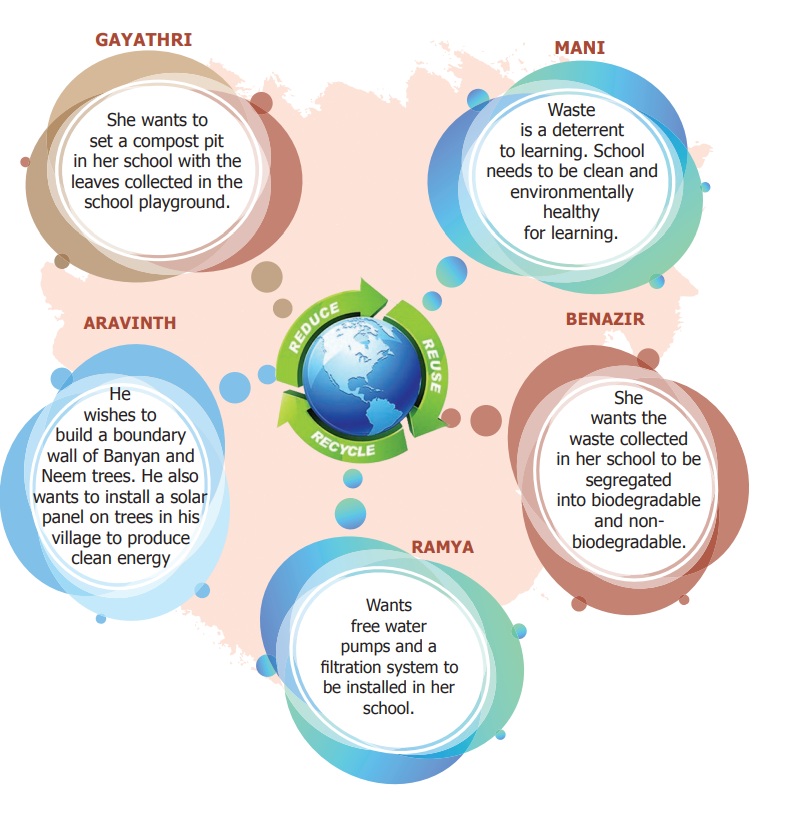
Waste is a giant that is becoming bigger by the day. It is going to harm the future generations even more than the current ones. The problems may be varied but there is a common approach to solve all of them.
Now it is your turn to work towards making your school sustainable and environmental friendly. Keep your project simple. The above are a few ideas; you are free to add your own ideas.
Guidelines
* Start an eco-club.
* Brainstorm and arrive at viable proposals for the project with the help of your teacher (such as one focussing on composting, energy-awareness, kitchen garden or recycling of water).
* Form appropriate groups and a students’ council to head the same according to the proposal taken.
* You need the right team to build confidence in an idea and ultimately execute it.
* Design a project manual which explains the requirements.
* Present your project manual and a letter of request to your Head Master to institute a green revolving fund.
* Help your campus conduct an assessment on a periodic basis. (Develop an eco-contest in your campus and groups can compete against each other.)
* Develop a campaign. Write slogans and prepare placards. Organize monthly rallies to create community awareness.
* Explore every avenue for availability of resources. (eg. (a) for a compost pit, students can be asked to collect their kitchen waste and drop it in the compost pit in the campus. (b) for segregations of waste in two bins – red and green (non-biodegradable and biodegradable) – can be placed on each floor.)
* Execute your project and conduct appraisals on a regular basis by your teacher.
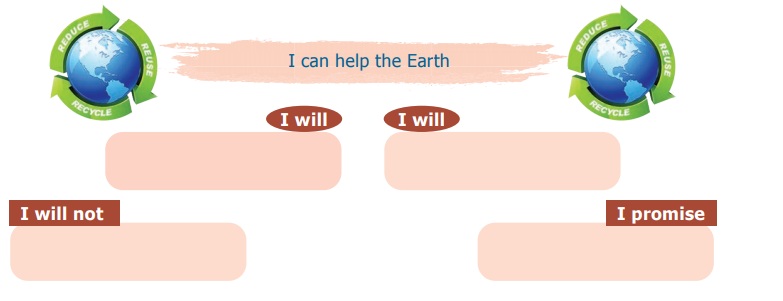
Grammar
TENSES
1. PRESENT TENSE
i. SIMPLE PRESENT (verb+s/es)
ii. PRESENT CONTINUOUS (am/is/are+verb+ing)
iii. PRESENT PERFECT (has/have+past participle)
iv. PRESENT PERFECT CONTINUOUS (has/have+been+verb+ing)
II. PAST TENSE
i. SIMPLE PAST (past form of the tense)
ii. PAST CONTINUOUS (was/were+verb+ing)
iii. PAST PERFECT (had + past participle)
iv. PAST PERFECT CONTINUOUS (had+been+verb+ing)
3. FUTURE TENSE
i. SIMPLE FUTURE (shall/will + verb)
ii. FUTURE CONTINUOUS (shall/will +be + verb+ing)
iii. FUTURE PERFECT (shall/will+ have + past participle)
iv. FUTURE PERFECT CONTINUOUS (shall/will+have been + verb+ing)
1. PRESENT TENSE
i. SIMPLE PRESENT (verb+s/es)

True in the present
* He works in a studio.
* She is sixty years old.
* We live in Chennai.
Habits
* I always drink coffee at work.
* He wakes up at 7 a.m. every day.
* They usually eat dinner at home.
General facts/truths
* The Earth revolves around the Sun.
* The Sun rises in the East.
* Water boils at 100oC.
Future timetables/schedules
* My train arrives tomorrow.
* We fly to Paris on Monday.
* Classes begin next week.
ii. PRESENT CONTINUOUS (am/is/are+verb+ing)
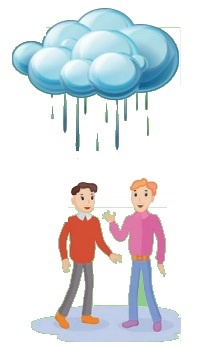
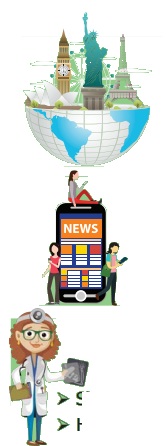
Happening now
* It is raining.
* I’m eating lunch now.
Fixed plans
* I am meeting my friends after work.
Temporary actions
* I’m working in New York this week.
Trends
* More and more people are using cell phones to access the Internet.
Longer actions in progress now
* She is studying to become a doctor.
* He is training for a marathon.
iii. PRESENT PERFECT (has/have+past participle)

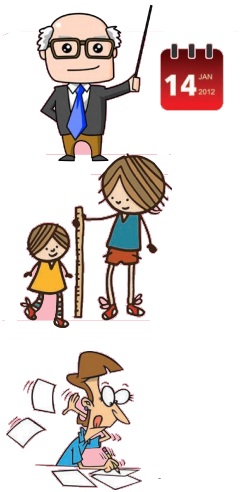
Action completed in the immediate past
* We have planned the meeting for next week.
* I have joined the duty.
* She has completed the home work.
Event in the past at an unspecified time
* She has been to Paris.
* I’ve seen that movie.
Duration from the past until now
* He has been a teacher since 2002.
Change over time
* Your English has improved since the last time we met.
* My niece has grown a lot in the past year.
Repeated events in the past until now
* We have had four exams so far in this semester.
* I’ve been to this restaurant many times since I moved next door.
iv. PRESENT PERFECT CONTINUOUS (has/have+been+verb+ing)
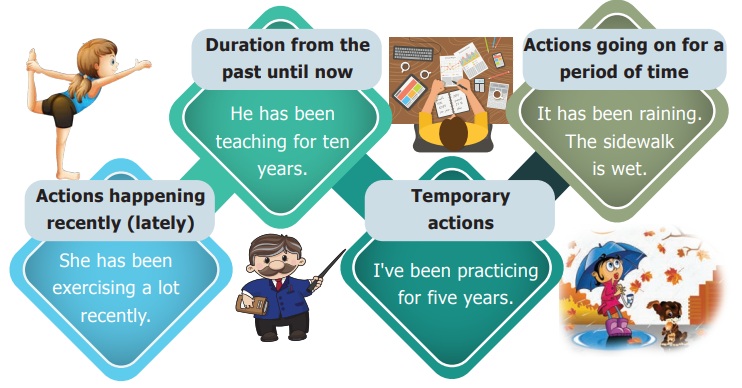
II. PAST TENSE
i. SIMPLE PAST (past form of the tense)
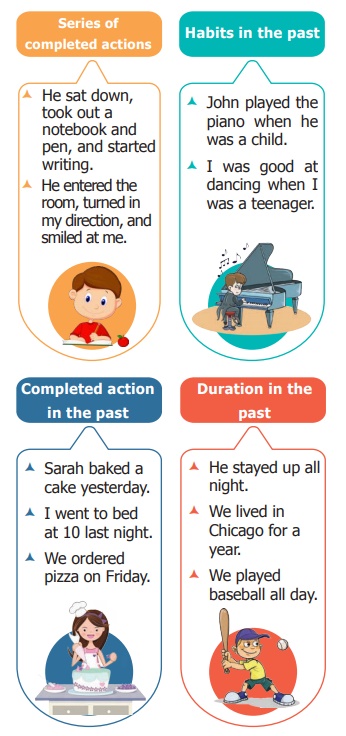
ii. PAST CONTINUOUS (was/were+verb+ing)
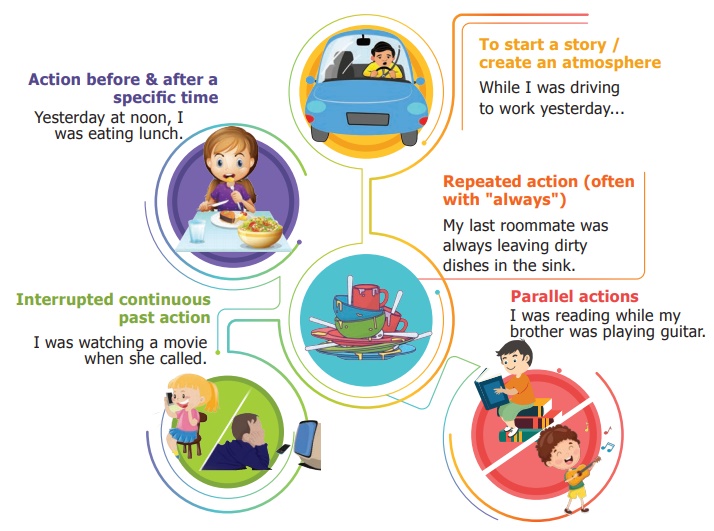
iii. PAST PERFECT (had + past participle)
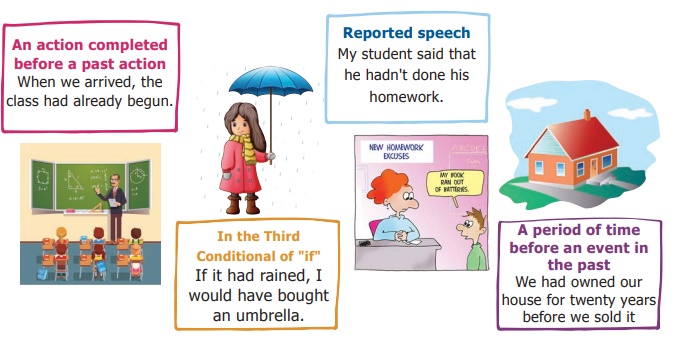
iv. PAST PERFECT CONTINUOUS (had+been+verb+ing)
Continued action in the past, before an action in the past
He had been waiting for an hour when she finally arrived.
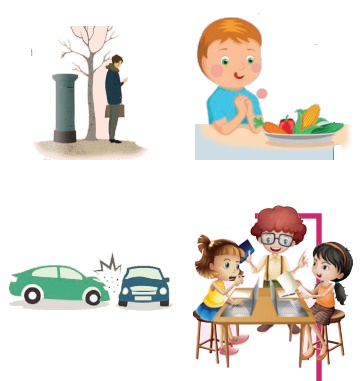
“If”- impossible condition
If I had been paying attention, I wouldn’t have got into an accident.
Cause of something in the past
He went on a diet because he had been eating too much.
Reported speech
She said that John had been helping her study for months.
3. FUTURE TENSE
i. SIMPLE FUTURE (shall/will + verb)

* Someone is at the door. I’ll see who it is. (at the present moment)
* I will help you with your homework tonight. (promise/offer)
* She won’t tell me her password. (refusal)
Willingness: (will + verb)
My Mother will get a Foot Ball today
Future Fact: (will + verb)

Plan or Intention (be going to + verb)
* I’m going to watch a movie tonight.
* He’s going to have a party this weekend.
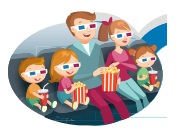
Prediction
* It is cloudy. It’s going to rain. (evidence)
* You’ll go abroad someday. (opinion)
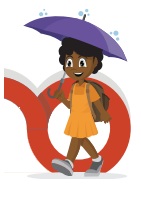
ii. FUTURE CONTINUOUS (shall/will +be + verb+ing)
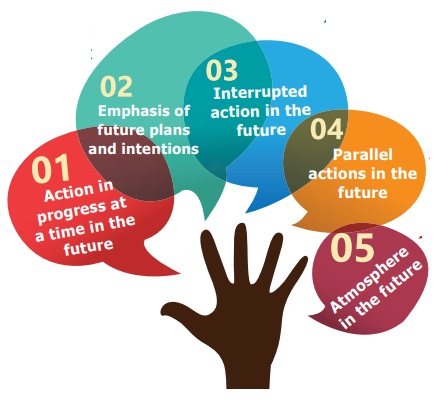
They’ll be coming to visit us next week.
She will be taking an exam at 2 p.m. tomorrow, so don’t call her then.
I will be waiting for you when you arrive tonight.
She will be watching TV, and he will be cooking dinner.
While he cooks dinner, she will be watching TV.
When I enter the class, the teacher will be teaching, some students will be taking notes, and my best friend will be trying to stay awake.
iii. FUTURE PERFECT (shall/will+ have + past participle)
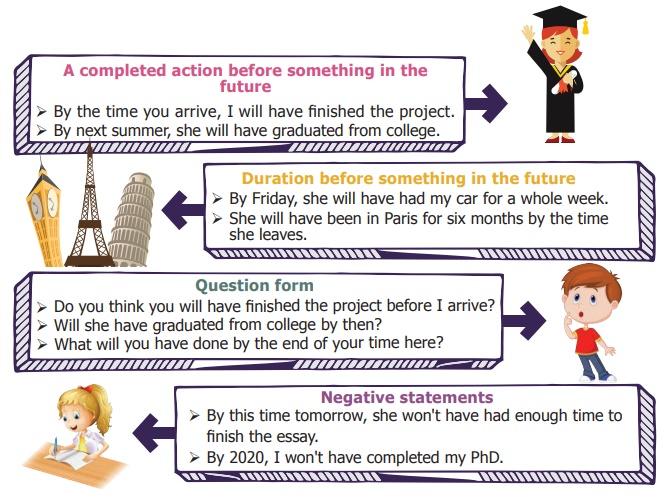
iv. FUTURE PERFECT CONTINUOUS (shall/will+have been + verb+ing)
1. Cause of something in the future
* Her English will be excellent by the time she visits the U.S. because she will have been studying it for five years.
* He will be tired by the time he arrives because he will have been travelling all day.

2 Duration before something in the future
* He will have been waiting for an hour when she finally arrives.
* She will have been working at the company for ten years by the time I retire.
Simple Present Tense
A. Choose the correct form of the present tense verb from the options given.
1. All children learn something new every day.(learn/ learns/ learned)
2. A good student always work hard.(work / works / worked)
3. Engineers build bridges. (build / builds / built)
4. My sister is an architect.She designs skyscrapers. (design/ designs / designed)
5. The Himalayas protects India from the cold winds. (protect/ protects/ protected)
6. It always drizzles here in the afternoon. (drizzle / drizzles / drizzled)
7. My mother works in a factory. (work/ works/ worked)
8. Kamali speaks English very well, but she doesn’t understand Hindi. (speak/ speaks/ spoke)
9. Cows give us milk. (give/ gives/ gave)
10. The trains to Chennai always run on time. (run / runs / ran)
Present Continuous Tense
B. Make sentences in the present continuous tense using the verb given in brackets.
1. Who is that boy standing on the table? (stand)
2. What are you doing? (do) I am listening (listen) to music.
3. My brother is working (work) in London now.
4. I am waiting (wait) for my mother.
5. It is better not to disturb her, she is working (work).
C. What are they doing? Use the verbs below and write sentences.
eat cry play read sing watch
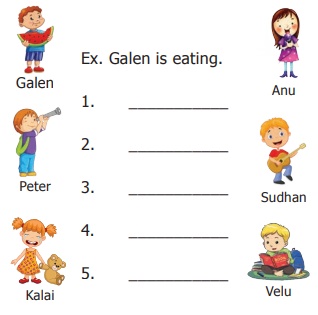
1. Answer: Peter is watching
2. Answer: Sudan is playing
3. Answer: Velu is reading
4. Answer: Anu is singing
5. Answer: Kalai is crying
D. Look at the picture again and answer the questions.
1. Is Galen reading? Answer: No, Galen is eating
2. Is Velu eating? Answer: No, Velu is reading
3. Is Kalai dancing? Answer: No, Kalai is crying
4. Is Peter watching TV? Answer: No, Peter is watching through a telescope
5. Is Anu crying? Answer: No, Anu is singing
E. Write the –ing form of the verbs.
1. Come Answer: Coming
2. Take Answer: Taking
3. Fly Answer: Flying
4. Swim Answer: Swimming
5. Study Answer: Studying
6. Read Answer: Reading
F. Write negative sentences.
1. He is learning to read.
Answer: No, He isn’t learning to read
2. I am having a bath.
Answer: No, I am not having a bath
3. I’m reading a fantastic book.
Answer: No, I’m not reading a fantastic book
4. Raja is driving a new car.
Answer: No, Raja is not driving a new car
5. I’m looking for my bag.
Answer: No, I’m not looking for my bag
G. Write questions for the answers.
1. Are they singing? No, they aren’t singing.
2. Is she writing a new book? Yes, She is writing a new book.
3. Is it working? Yes, It is working.
4. Is he doing the project? No, he isn’t doing the project.
5. Are you planning to go? Yes, We are palning to go.
H. Fill in the blanks with verbs in the present continuous.
1. You are listening (listen) to the music.
2. He is crying (cry).
3. I am swimming (swim) in the pool.
4. Latha is waiting (wait) for her daughter.
5. Is she watching (watch) TV?
6. Who is he helping (help)?
7. Her father is not cooking (not/cook) dinner.
8. Akila is not singing (not/sing) a song.
9. My brother is not doing (not/do) his homework.
10. Is your mother working (work) today?
11. Amutha and Praba are playing (play) tennis.
12. Amith and Ravi are not swimming (not/swim) in the lake.
I. Make sentences in the present perfect tense using the verbs in brackets.
1. She has never apologized to anybody.
(never apologized, has never apologized, have never apologized)
2. My mother has been to London.
(has been, being in, have been )
3. I have read all the plays of Shakespeare.
(read, had read, have read)
4. Have you finished your lunch?
(finish, finished, had finished)
5. Has he brought his bike?
(Had, Has, Have)
J. Present perfect with “ever and never”
Have you ever…?
Question: Have you ever eaten a kiwi fruit?
Answer: Yes, I have eaten a kiwi fruit. Or No, I have never eaten a kiwi fruit.
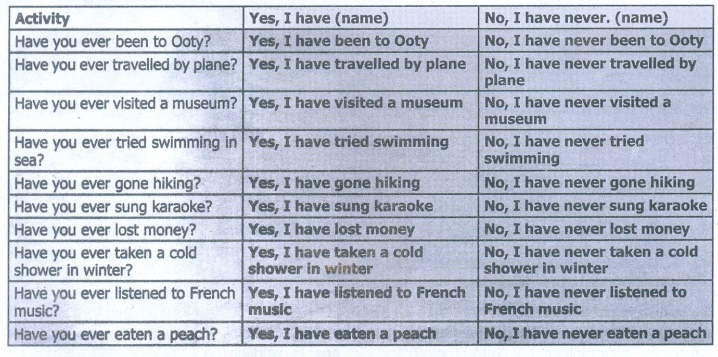
K. Present Perfect Continuous Tense
Make sentences in the present perfect continuous tense using the verbs in brackets.
1. How long have you been waiting ? (are you waiting, have you been waiting, have you waited)
2. She has been working in the garden since morning. (is working, has been working, work)
3. I have been using this mobile for three years. (am using, has used, have been using)
4. The children have been playing in the park. (has been playing, have been playing, had been playing)
5. The workers have been demanding higher wages for a long time. (has been demanding, have been demanding, demand)
Simple Past Tense
L. Complete the story using the past tense of the verbs.
![]() The Hare and the Tortoise
The Hare and the Tortoise 
One day a ![]() and a
and a  decided to have a race. The
decided to have a race. The  knew (know) that the
knew (know) that the ![]() could (can) run faster than him. But the
could (can) run faster than him. But the  was (be) more intelligent than the
was (be) more intelligent than the ![]() . ‘Yes, I’ll race you,’ said (say) the
. ‘Yes, I’ll race you,’ said (say) the  . The
. The  had (have) a clever plan. He found (find) his brothers and sisters and he told (tell) them to wait in different places along the path of the race. So they all hide (hide) behind the trees along the path. The race began (begin)! The
had (have) a clever plan. He found (find) his brothers and sisters and he told (tell) them to wait in different places along the path of the race. So they all hide (hide) behind the trees along the path. The race began (begin)! The  ran (run) as fast as possible. But the
ran (run) as fast as possible. But the ![]() was (be) faster, of course. ‘This will be a very easy race’, thought (think) the
was (be) faster, of course. ‘This will be a very easy race’, thought (think) the ![]() . So the
. So the ![]() decided (decide) to rest, and he quickly fell (fall) asleep at the side of the road. Suddenly, the
decided (decide) to rest, and he quickly fell (fall) asleep at the side of the road. Suddenly, the ![]() woke up (wake up) and he saw (see) a
woke up (wake up) and he saw (see) a  ahead of him! ‘How did he get ahead of me?’ the
ahead of him! ‘How did he get ahead of me?’ the ![]() asked himself. In fact, it was (be) not his friend the
asked himself. In fact, it was (be) not his friend the  : it was (be) the
: it was (be) the  ‘s sister. But to a
‘s sister. But to a ![]() , all tortoises look the same. The
, all tortoises look the same. The ![]() ran (run) past the
ran (run) past the  easily. Soon, he could not (cannot) see the
easily. Soon, he could not (cannot) see the  , so he sat (sit) down to rest. Then the
, so he sat (sit) down to rest. Then the ![]() got up (get up) and continued the race. But as the
got up (get up) and continued the race. But as the ![]() turned (turn) around the last corner before the finish line, his friend the
turned (turn) around the last corner before the finish line, his friend the  crossed the line and won (win) the race!
crossed the line and won (win) the race!
M. Finish each clue by changing the verb within brackets to an irregular past-tense verb.
Then complete the crossword puzzle.
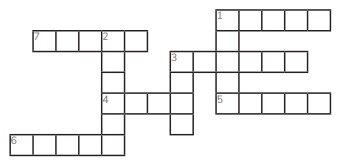
Across
1. The lake (freeze) froze overnight.
3. Hema (buy) bought a new bicycle.
4. Aravind (give) gave me a slice of pizza.
5. We (drink) drank milk.
6. The dog (sleep) slept on the sofa.
7. He (write) wrote a letter to his cousin in America.
Down
1. I (find) found a coin on the ground.
2. Tony (teach) taught his cat to use the litter box.
3. Selvi (blow) blew out the candle.
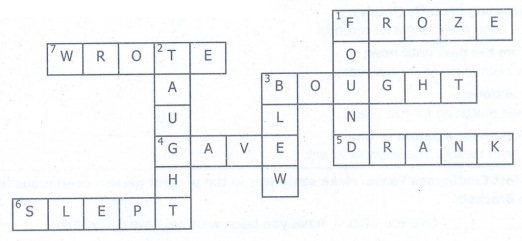
Past Continuous Tense
N. Make sentences in the past continuous tense using the verb in brackets.
1. The children were waiting (wait) for the bus.
2. The girls were learning (learn) their lessons.
3. I was playing (play) in the rain all evening.
4. Vijay was repairing (repair) his car.
5. Hari was working (work) hard to pass the entrance examination.
Past Perfect Tense
O. Complete the sentences using the past perfect tense.
1. Kalai didn’t complete his homework because he had become tired.
2. By the time Sundar got up his sister had gone to school.
3. When we reached the park, my friends had left.
4. Saralah didn’t want to see her as she had decided to avoid her.
5. Manohar was laughing because he had liked the joke very much.
Past Perfect Continuous Tense
P. Circle the correct verb form in each of the following sentences.
1. Ezhil had been baking baked / had been baking a cake when they came.
2. Veeran had been cleaning cleaned / had been cleaning the room since morning.
3. We had been working worked / had been working in the city for ten years before we moved to the village.
4. The cat had been waiting had been waiting/was waiting for the mice to come out of its hole.
5. Kannan had been looking had been looking/ have been looking for a job for a long time.
Simple Future Tense
Q. Complete the sentences using the correct form of the verbs in brackets.
1. We hope you will have (have) a great time in Ooty.
2. I think Manju will visit (visit) her grandparents during the vacation.
3. Be careful, that mirror will fall (fall) on the floor.
4. As soon as my father arrives, we shall / will go (go) to watch the film.
5. When your train arrives, I shall / will wait (wait) for you at the station.
Future Continuous Tense
R. Make sentences in the future continuous tense using the verb in brackets.
1. Ashwin will be completing (complete) M.B.A. in another two years.
2. I will be going (go) to Thanjavur by this time tomorrow.
3. Prabha will be receiving (receive) the best student award in six months’ time.
4. The plane will be leaving (leave) at 3 o’clock.
5. He will be attending (attend) the conference.
S. What is Amala going to do? Given below is Amala’s schedule for next week. Read it and answer the questions using the future continuous tense.
Amala’s Schedule

1. What will Amala do on Sunday morning?
Answer: Amala will be visiting her grandmother on Sunday morning.
2. What is Amala planning to do on Saturday afternoon?
Answer: Amala will be preparing sweets on Saturday afternoon.
3. Where is Amala going on Wednesday morning?
Answer: Amala will be going to the library to return the library books on Wednesday morning.
4. Who is Amala meeting on Tuesday morning?
Answer: On Tuesday morning, Amala will be meeting her friends.
5. What will she buy on Monday afternoon?
Answer: Amala will be buying groceries for the week on Monday afternoon.
Future Perfect Tense
T. Match words from the different columns to make reasonable predictions. Then write them down in the space below. One has been done as an example.
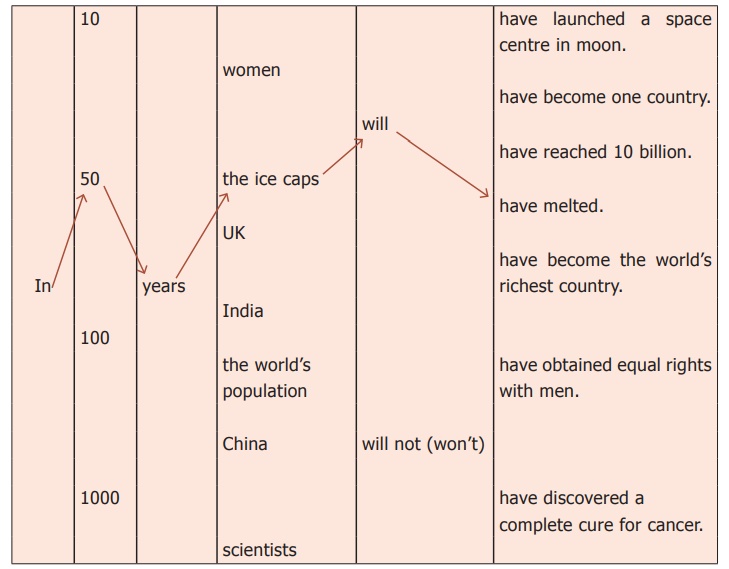
Write the sentences.
In 50 years the ice cap will have melted.
2. Answer: In 100 years India will have become the world’s richest country.
3. Answer: In 50 years India will have launched a space centre in moon.
4. Answer: In 10 years the world’s population will have reached 10 billion.
5. Answer: In 50 years scientists will have invented a complete cure to cancer.
6. Answer: In 1000 years India will have become one country.
7. Answer: In 50 years women will have obtained equal rights with men.














